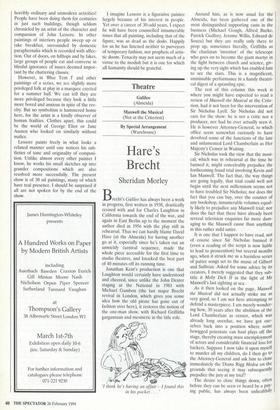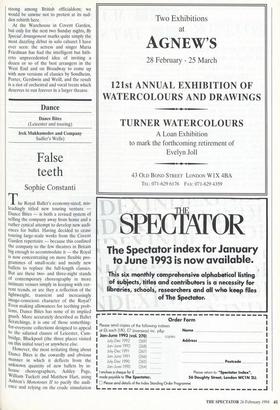Theatre
Maxwell the Musical (Not at the Criterion) By Special Arrangement (Warehouse) Galileo (Almeida)
Hare's Brecht
Sheridan Morley
Brecht's Galileo has always been a work in progress, first written in 1938, drastically revised with and for Charles Laughton in California towards the end of the war, and again in East Berlin up to the moment the author died in 1956 with the play still in rehearsal. Thus we can hardly blame David Hare (at the Almeida) for having another go at it, especially since he's taken out an unwieldy carnival sequence, made the whole piece accessible for the first time to studio theatres, and knocked the best part of 40 minutes off its running time.
Jonathan Kent's production is one that Laughton would certainly have understood and cheered, since unlike the John Dexter staging at the National in 1981 with Michael Gambon (the last major Brecht revival in London, which gives you some idea how the old pirate has gone out of fashion over here), it restores the notion of the one-man show, with Richard Griffiths gargantuan and mesmeric in the title role.
'I think he's having an affair — I found this in his pocket . . Around him, as is now usual for the Almeida, has been gathered one of the most distinguished supporting casts in the business (Michael Gough, Alfred Burke, Patrick Godfrey, Jerome Willis, Edward de Souza) but they are really only there to prop up, sometimes literally, Griffiths as the charlatan 'inventor' of the telescope who goes on to become the giant martyr in the fight between church and science, giv- ing up the very sight which has enabled him to see the stars. This is a magnificent, unmissable performance in a handy theatri- cal digest of a sprawling epic.
The rest of this column this week is where you might have expected to read a review of Maxwell the Musical at the Crite- rion, had it not been for the intervention of Sir Nicholas Lyell. Sir Nicholas did not care for the show: he is not a critic nor a producer, nor had he ever actually seen it. He is however Attorney-General, to which office seem somewhat curiously to have devolved some of the functions of the late and unlamented Lord Chamberlain as Her Majesty's Censor in Waiting.
Sir Nicholas took the view that the musi- cal, which was in rehearsal at the time he banned it, might conceivably prejudice the forthcoming fraud trial involving Kevin and Ian Maxwell. The fact that, the way things are going legally, that trial could well not begin until the next millennium seems not to have troubled Sir Nicholas; nor does the fact that you can buy, over the counter of any bookshop, innumerable volumes equal- ly likely to prejudice any Maxwell trial; nor does the fact that there have already been several television enquiries far more dam- aging to the Maxwell cause than anything in this rather mild satire.
It is one that I happen to have read, not of course since Sir Nicholas banned it (even a reading of the script is now liable to lead to prosecution) but several months ago, when it struck me as a harmless series of patter songs set to the music of Gilbert and Sullivan. Asked for some advice by its creators, I merely suggested that they sub- title it Moby Dick 11 in the light of Mr Maxwell's last sighting at sea. As it then looked on the page, Maxwell the Musical did not actually strike me as very good, so I am not here attempting to defend a masterpiece. I am merely wonder- ing how, 30 years after the abolition of the Lord Chamberlain as censor, which was already long overdue, we have got our- selves back into a position where some bewigged potentate can haul plays off the stage, thereby creating mass unemployment of actors and considerable financial loss for backers. Suppose I now take it upon myself to murder all my children, do I then go to the Attorney-General and ask him to close immediately the Diana Rigg Medea on the grounds that seeing it may subsequently prejudice the jury at my trial?
The desire to close things down, often before they can be seen or heard by a paY- ing public, has always been unhealthily
strong among British officialdom; we would be unwise not to protest at its sud- den rebirth here.
At the Warehouse in Covent Garden, but only for the next two Sunday nights, By Special Arrangement marks quite simply the most dazzling debut in solo cabaret I have ever seen: the actress and singer Maria Friedman has had the intelligent but hith- erto unprecedented idea of inviting a dozen or so of the best arrangers in the West End and on Broadway to come up with new versions of classics by Sondheim, Porter, Gershwin and Weill, and the result is a riot of orchestral and vocal treats which deserves to run forever in a larger theatre.



























































 Previous page
Previous page